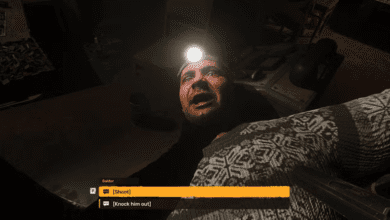The Life of Chuck Review: A Film That Explores Life, Death, and Everything In Between
Stephen King’s name is synonymous with horror, but some of his most beloved stories transcend that genre, often transforming into cinematic masterpieces. Films like The Shawshank Redemption and Stand By Me stand out as prime examples of his non-horror works that resonate deeply with audiences. Now, “The Life of Chuck” joins the ranks of these emotionally driven tales. Under the skilled direction of Mike Flanagan, this film uncovers joy and hope even amidst life’s inevitable end.

The brilliance of this movie doesn’t solely rely on its narrative but also on the remarkable ensemble cast that gives life to each character. “The Life of Chuck” showcases Stephen King’s heart-warming, uncynical side, celebrating the beauty of human experience in a way that’s deeply moving.
A World on the Brink: Opening the Film With Dystopia
At the beginning of The Life of Chuck, the world is facing its end. Marty Anderson (played by Chiwetel Ejiofor), an English teacher, struggles to keep his students interested as society collapses around them. The Earth is ravaged by natural disasters, and the communication infrastructure has almost crumbled. The world, as we know it, seems to be taking its final breath. Amidst this chaos, a strange constant lingers a retirement notice from a local bank, thanking Charles Krantz (played by Tom Hiddleston) for 39 wonderful years. This mysterious ad continues to appear on billboards and in broadcasts long after all other communication ceases. But who is Charles Krantz, and why does his retirement seem so vital in the midst of an apocalyptic world?
A Tale of Life and Death Interwoven
One of the film’s standout qualities is its non-linear narrative structure. Rather than adhering to the traditional three-act framework, The Life of Chuck is divided into three distinct segments, each offering a unique glimpse into the apocalyptic world and the life of Charles Krantz. The film masterfully weaves together these seemingly unrelated vignettes, enhancing their individual impact and giving them a new meaning when seen as part of the larger whole.
Director Mike Flanagan’s ability to blend these narrative threads into a cohesive whole is truly impressive. This seamless weaving allows each vignette to elevate the other, making The Life of Chuck a film that begs for multiple viewings. You’ll find yourself wanting to rewatch it just to catch the subtle connections you might have missed the first time around.
Strong Performances That Steal the Show
Though the entire cast delivers stellar performances, one actor truly shines Benjamin Pajak, who plays the 11-year-old Charles Krantz in the film’s final act. Despite his young age, Pajak brings an “old soul” quality to his character, balancing the exuberant joy of life with moments of deep emotional maturity. One of the film’s most surprising and delightful elements is the amount of dancing that takes place, particularly by the young Charles. Pajak’s dance sequences are full of joy, perfectly counterbalancing the emotional weight of the story.
The role of young Charles is no easy task. Pajak’s portrayal demands a high level of emotional depth and physicality, requiring him to blend believably with another actor’s interpretation of the same character. He pulls it off with grace and charm, making his segment the most engaging part of the film.
Celebrating Life in the Face of Death
At its core, The Life of Chuck is a celebration of life. Even as the film addresses mortality and the inevitability of death, it focuses on the beauty of living. In one of the most poignant messages of the film, Flanagan suggests that every person carries an entire universe within them filled with memories, experiences, and relationships that don’t simply disappear, even when life does. This rich inner life, the film argues, doesn’t diminish with death; it lingers in ways both seen and unseen.
While Flanagan’s life-affirming message may resonate with many, it might also alienate some viewers. For some, the film’s earnest tone, with its open-hearted embrace of sentimentality, could feel emotionally manipulative. However, the film’s narrative includes enough darkness and eerie elements typical of Stephen King’s works to ensure it doesn’t become overly sweet or saccharine.
A Touch of Darkness to Balance the Light
Though The Life of Chuck is undoubtedly one of Stephen King’s most heart-warming stories, it still carries a touch of his signature darkness. This helps ground the film, preventing it from veering into overly sentimental territory. Even in King’s non-horror tales, there is always a sense of unease or mystery, and this film is no exception. While the nonlinear narrative may challenge some viewers, and the sentimentality might be too heavy-handed for others, it’s hard not to be swept up in the charm of the story.
Tom Hiddleston’s performance as the titular Chuck is both touching and understated. Though he may not have as much screen time as the advertising might suggest, Hiddleston perfectly captures Chuck’s essence. His portrayal sheds the sardonic edge he’s brought to characters like Loki in the Marvel universe, offering a more tender and reflective performance here.
A Cinematic Experience That Lingers
The film’s beauty lies in its complexity and in the way it unfolds in reverse. The non-linear structure isn’t just a gimmick; it forces the viewer to actively piece together the story, making it more engaging. This structure, combined with the stellar performances and the heartfelt message at its core, makes The Life of Chuck a film that will stay with you long after the credits roll.
Themes of Mortality, Legacy, and Human Connection
Adapted from the novella If It Bleeds, this film is essentially about human mortality, presented through a surreal, almost dreamlike lens. Mike Flanagan masterfully balances tragedy with light-heartedness, making the film feel more like a strange, dark comedy than a straightforward drama. There are clear parallels to Charlie Kaufman’s works like Synecdoche, New York, but The Life of Chuck offers a slightly more accessible narrative for audiences, despite its layered complexity.
One of the film’s most memorable lines comes from King himself: “When an old man dies, a library burns down.” This quote, introduced by Flanagan at the film’s world premiere, encapsulates the movie’s deeper theme that every person carries a universe of knowledge, experience, and memory that is lost when they pass away. The recurring image of a billboard paying tribute to Charles Krantz mirrors this idea, slowly revealing its significance as the film unfolds.
Final Thoughts: A Film That Deserves to Be Revisited
The Life of Chuck isn’t just a movie; it’s an experience. It’s a celebration of life’s fleeting moments, a meditation on death, and a reminder that even in the darkest times, there’s joy to be found. Stephen King’s story, combined with Mike Flanagan’s direction, creates a movie that feels like a warm, emotional embrace.
While it may not appeal to everyone, those who embrace its themes will find themselves deeply moved. The film’s underlying warmth and poignancy will likely give it lasting appeal, possibly even cult status. So if you’re in the mood for something that’s equal parts thought-provoking and heart-warming, The Life of Chuck is a film that’s well worth your time.





